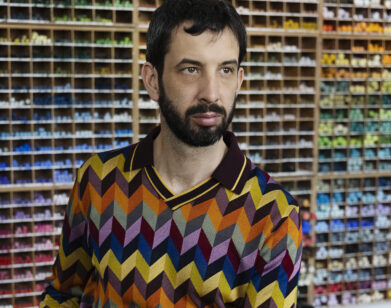Success and Shadows: Emma Forrest Comes to Terms

EMMA FORREST. PHOTO COURTESY OF SEAMUS MCGARVEY
Success often goes hand-in-hand with suffering. In Your Voice In My Head (Other Press), Emma Forrest explores the rush of fame and the dark, lonely places it can leave you. London-born Forrest was writing for The Guardian at 16, interviewing celebrities and traveling around the world. Yet, as she grew older, her bold eccentricities became bloody habits: she cut her arms, stomach and thighs, threw up meals, and eventually attempted suicide. Forrest’s memoir is a journey of healing, centered around Dr. R, the therapist who saved her life and then died of cancer. Losing this source of stability and caught in a tumultuous, intense love affair with Colin Farrell, Forrest’s heart was fractured just as she felt almost healed. We talked with Forrest about New York bringing out her neurosis, how achievement shaped her adolescence (not always for the best) and how therapy can fix a fractured heart.
YOUNG: I should warn you before we start that both my parents are shrinks.
FORREST: Oh! That’s a good warning, wow, that’s a first.
YOUNG: [laughs] Famous figures and celebrities are sometimes tied to your sense of doom. Where does that connection come from?
FORREST: Yeah, a lot of the time in my recurring dreams, before I was diagnosed, iconic people would either be good or evil figures. I remember dreaming really basic stuff like trying to navigate the London underground, but then Paul Newman would be the only one who would direct me to the right trains. And I’m trying to remember who would direct me to the wrong ones. I think it’s also from such a young age, I was raised and have raised myself on film to such an extent, that it has sometimes bled into my reality. There are times I’ve felt very Mulholland Drive, where people’s dream worlds overlap with each other.
YOUNG: I got the sense that New York City brought your dark side to the surface. What do you think the difference between neurotic and unstable is?
FORREST: [laughs] Well, it’s very simple, I think a neurotic learns from their mistakes. That’s it. No, really. A psychotic does not.
YOUNG: And being around so many other neurotic people in New York, do you think that helped, or did it make it worse?
FORREST: I think it meant that I didn’t know there was something really wrong, because everyone was crazy. It’s just that everyone else was still functional. I didn’t realize that I was any worse off.
YOUNG: Do you think success at such a young age kind of contributed to your sadness?
FORREST: Oh, I think definitely. You know what, thank God the Internet didn’t exist when I was 15, 16. I knew people were tearing me apart, but my God, if there had been a net and commenters and I would have been reading them—it was bad enough as it was. To grow up in the media eye, I’m glad it happened, but that was definitely not healthy being around adults all the time. Someone asked me the other day, “Oh your story is like Cameron Crowe’s, he has the same thing of having been a teenage journalist,” but he was a guy and you just add gender into the mix, it’s a 16-year-old girl with adults and rock stars, and it’s tough.
YOUNG: Well, I’m sure that it opened doors that a guy couldn’t get into, yet at the same time lead to some horrible situations.
FORREST: Yeah, definitely. There is that doll dress-up quality of adorable teenage girl writer, and I never felt either as adorable as I was supposed to be, or as dark as the rumors, you know, “She must have slept with the editor,” and I was like, “Oh my god, I’m still a virgin.” It was very strange.
YOUNG: You say in the book, “A lot of Americans prefer their survivors when they’re not physically disfigured by tragedy.” I’m wondering where that comes from and why you think that is?
FORREST: Wow. Well, child of psychiatrists, I wish you would answer it for me, but, I think it’s sort of the hypothetical point where communism and fascism meet. They love tragedy, and they love surface beauty. You just watch it play out over and over in the media. It was the English edition of Glamour who were looking for stories of Iraqi war widows, but specified that they had to be attractive. That said, I do think everything that happens in American pop culture sort of prescribes for England and does end up happening there six months later, maybe a year.
YOUNG: And if Americans prefer their tragic figures not disfigured, how do you think cutting yourself played into that? That’s a very physical thing.
FORREST: Yeah. Well, it is supposed to be secret, it is generally under-sleeve. So usually people don’t know, and it is sort of saying you’re wrong when you say that I’m this special, high-achieving, attractive young woman. Look, I’m looking at myself, I’m cut, and I have been vomiting all day, and I’m disgusting. It’s like looking in a mirror and going “Ha! Caught you.”
YOUNG: How do you fall out of love with madness?
FORREST: I think a big part of it is growing up, and I think what Dr. R afforded me was he kept me alive long enough to grow out of it. And I think that’s the function of a lot of psychiatrists and therapists, is keeping people afloat just long enough for them to get older.
YOUNG: Why can moments of peace and love shock us?
FORREST: When they’re actually tangible, when you can touch them. When you actually feel them, you almost laugh.
YOUNG: When can healing begin?
FORREST: I think healing can begin when you tap into what Dr. R said, which is sometimes you have to accept that the only closure you’re ever going to get is knowing that you’re not going to have closure.
YOUNG: That’s so tough.
FORREST: Yeah.
YOUNG: Would you say that Dr. R acted as an outside judge of your life?
FORREST: Yeah, totally, because I was such a pessimist and he was such a positivist. And I think my mum, who I’m very much like, always thinks the worst as well, so this was not just an outside voice, but a voice I had never experienced in my growing up.
YOUNG: Going back to closure being that there is no closure, you have this intense love affair. In some ways you have two losses: you have Dr. R dying and you have the end of this affair. And somehow the love affair felt more tragic, if only because death takes someone away and that’s it, there’s no going back.
FORREST: Yes, exactly.
YOUNG: But with someone who’s still alive, that you cared so deeply about, they’re always going to be around, so how does closure apply to love?
FORREST: I think what gets you through is the thing that makes it so terrible in the first place, which is memory. At the start you’re going, “Oh god, but we did this here and we did that there, and that time we went.” But then, by the end, memory is what makes it all safe, because ultimately, you have control over that. That’s yours to access when you feel like it. It becomes that thing of moving those memories from your wallet that you see at every single time you open your purse, moving it into a special photo album that you get out when you want to look at it, twice a year.
YOUNG: And when are those moments?
FORREST: It varies. When you’re past all of it, then it’s actually happy times. You never expect that when you think of that person your heart will sort of feel big rather than shriveled. That’s just what time does. Again, you asked about it being tangible to feel peace and love, it’s also so weird those moments when you really do feel that time has healed a wound.
YOUNG: And then with Dr. R’s death, with this tremendous loss, I’m wondering what the ultimate lesson that you took from him is?
FORREST: [laughs] That it’s never as bad as I think it is.
YOUR VOICE IN MY HEAD IS OUT MAY 3.






